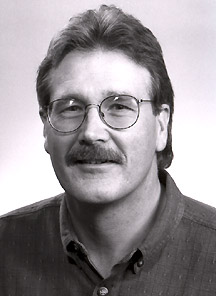Faculty Promotions and Appointments Announced—Fowler, Yeager Become
Institute’s Newest Full Professors—
By Mika Ono
Faculty promotions and appointments were announced at a recent meeting
of The Scripps Research Institute (TSRI) Board of Directors.
Promotions include:
- Velia Fowler, full professor in the Department of Cell Biology. A
member of TSRI's faculty since 1987, Fowler (A.B., Oberlin College;
Ph.D., Harvard University) investigates the molecular basis of cell
architecture and movement; actin filament assembly and dynamics; and
the roles of tropomyosin, tropomodulin, and associated proteins. Her
research interests focus on the regulation of actin dynamics in muscle
cell contraction, cell crawling, red blood cell shape and the development
of the eye lens.
- Mark Yeager, full professor in the Department of Cell Biology. A
member of TSRI’s faculty since 1994, Yeager (B.S., Carnegie-Mellon
University; M.Phil., Ph.D. Yale University; M.D., Yale University School
of Medicine) studies the structure and function of cardiac gap junction
membrane channels. This work is essential for understanding the molecular
basis of current flow in the heart and may provide novel strategies
for treating cardiac arrhythmias.
- Howard Fox, associate professor with tenure in the Department of
Neuropharmacology. A member of TSRI since 1990, Fox (B.A., M.A., Johns
Hopkins University; Ph.D., M.D. University of California, San Francisco)
investigates the effects of HIV on the brain and therapeutic strategies
that might treat the resulting neurological symptoms. In another line
of research, he studies the sexual dimorphism of autoimmunity, wherein
women suffer disproportionately from autoimmune diseases.
- Klaus Hahn, associate professor without tenure in the Department
of Cell Biology. Hahn (B.A., University of Pennsylvania; Ph.D., University
of Virginia) came to TSRI in 1992 as a senior research associate. He
is currently developing new approaches to examining protein structural
changes and interactions within living cells in real time. He is currently
studying proteins that control both apoptosis and motility, focusing
on how spatial–temporal dynamics are used to regulate each protein’s
participation in these very different cell behaviors.
- Anne Hanneken, associate professor without tenure in the Department
of Cell Biology. A member of TSRI since 1994, Hanneken’s (B.S.,
Marquette University; M.D., Medical College of Wisconsin) research interests
include: regulation of growth factor activity in vivo by soluble receptors,
structural characterization and biological activity of the soluble FGF
receptors, regulation of soluble FGF receptor shedding by metalloproteases,
and inhibition of FGF-2 induced angiogenesis.
- Anette Schneemann, associate professor without tenure in the Department
of Molecular Biology. A member of TSRI since 1995, the work of Schneemann
(Diplom, University of Freiburg, Germany; Ph.D., University of Wisconsin,
Madison) focuses on viruses, most recently on the role of nucleic acid
in structure and assembly of RNA viruses and new methods of virus inactivation.
- Ana Angulo, assistant professor in the Department of Immunology.
Angulo (Ph.D., Universidad Autonoma de Madrid, Spain) has been at TSRI
since 1993. She studies the molecular pathways and viral determinants
that modulate cytomegalovirus gene expression, growth and pathogenesis.
- Amanda Roberts, assistant professor in the Department of Neuropharmacology.
Roberts (B.A., University of California, Santa Cruz; M.S., Ph.D., Oregon
Health Sciences University) came to TSRI in 1995 as a postdoctoral research
associate. She is currently developing models of alcohol drinking in
dependent animals and applying neuropharmacological techniques to determining
the mechanisms underlying craving and relapse. She also is involved
in feeding, drug self-administration and stress studies and performs
behavioral testing of knockout and transgenic mice in relation to neuroAIDS
and other central nervous system disease states.
- Gary Siuzdak, adjunct associate professor in the Department of Molecular
Biology. Director of TSRI's Center for Mass Spectrometry since 1990,
Siuzdak (B.S., B.A., Rhode Island College; Ph.D., Dartmouth College),
conducts research on viruses, work which has implications for the design
and screening of anti-viral drugs as well as diagnosing viral infections.
Siuzdak has also developed new bioanalytical techniques such as desorption/ionization
on silicon mass spectrometry, which is facilitating work in such diverse
areas as protein characterization, drug discovery and forensics.
- Robert Russo, adjunct assistant professor in the Department of Molecular
and Experimental Medicine. Russo (B.A., Ph.D., University of California,
Los Angeles; M.D. University of California, Irvine) utilizes intravascular
ultrasound, an invasive cardiovascular technology, for the diagnosis
of coronary artery disease and to guide coronary interventions (such
as angioplasty and stent placement).
New appointments include:
- Zhen Chai, adjunct assistant professor in the Department of Neuropharmacology.
Chai (B.S., Peking University; Ph.D., Stockholm University) investigates
cytokine production as a fever response regulator and studies its effects
on the brain.
- Edward Korzus, adjunct assistant professor in the Department of Cell
Biology. Korzus (Ph.D., University of Georgia) investigates mechanisms
regulating learning and memory consolidation at molecular, cellular,
and cognitive levels using genetically modified mice as a model.
Go back to News & Views Index
|


Velia Fowler, top, and Mark Yeager, bottom, have
been promoted to the rank of full professor.
|



